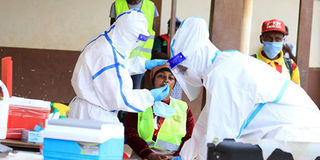Time social scientists took up their role

Eastleigh residents are tested for coronavirus, at Zawadi Primary School on May 20, 2020. PHOTO | JEFF ANGOTE | NATION MEDIA GROUP
What you need to know:
- Just as the Apostle John has done in the biblical Book of Revelation in imaging heaven and paradise, we need imaginations of human plagues and excellence.
- It would advance the course of human well-being for us to move beyond the bounds of our academic disciples as captured by the present.
The understanding that humans are social beings has come under test during the Covid-19 pandemic.
Of course, the various preliminary measures deployed to mitigate and combat the spread of the coronavirus have not extinguished our humanness.
This takes us to the never-ending conversation and the tendency to measure the value of social sciences and other academic disciplines in terms of their economic market contributions.
Social sciences and humanities have had a central role in guiding us to becoming more human by enhancing our social life, meaning of things and relations, albeit with unpleasant history and hangover from the post-European enlightenment thoughts.
Scholars and students of social sciences must now rethink their theories, research methods and societal imaginations.
One major limitation to this is that social sciences, more so sociology (a frontrunner in becoming an academic discipline), continues to replicate the logic and methods in natural sciences and unnecessary obsession with modelling and empirical data.
Individuals are treated as free beings that collectively form the society, eliciting the argument that the society controls the individual. Social science and humanities have only recently manoeuvred the boundaries of this ‘unfettered control’.
RETHINK PREMISES
In our concept of society, structure and agency must be separated. They are distinct and irreducible to either.
And there are many reasons why this perspective is useful. For instance, it is in the imagination of society and how it gets to be understood and related to human beings as individuals and groups that our social theories, methods of social science research and imaginations are done.
For far too long, these processes in social sciences and academic teaching have had a leaning towards the European social thinkers with unnecessary loyalty.
Indeed, even post-modernist disruptions - such as those expressed by scholarship in post-colonialism, liberation theologians, feminists and queer studies - have been undermined, largely due to this undue influence of post-European enlightenment thoughts and its leftovers.
The disruptions by the Covid-19 and its potential aftermath is an invitation for universities to rethink the premises for their social theories, methods of research and imaginations.
First is a shift away from the capture by empiricism, presentism and modelling and imagining only that which is known.
For even if we were to keep to the ‘copy and paste’ from natural sciences, natural sciences have long moved away from empiricism and presentism. Rather, they spend more time imagining the unknown and invisible future.
FORESTALLING
This is not a call to mimic natural sciences. I ask that social sciences take up their role of an apocalyptic critique of society.
We need scholarship and PhD projects that not only give an account of the present or past (as they notoriously do) but also consider the certainties and problematise them with futuristic imaginations.
Just as the Apostle John has done in the biblical Book of Revelation in imaging heaven and paradise, we need imaginations of human plagues and excellence.
Social scientists should shift their curiosity and pose questions such as, how would society be disrupted and what adjustments would they require to defend themselves from pandemics?
What kind of governance relations does an epidemic require? How would families be organised? And would the era of human rights survive? What about schooling? Would the category of friendship collapse or get a new meaning?
Very few of such questions have been seen. What has been observed is an obsession with questionnaires and regurgitation under the guise of historicising.
RESEARCH QUESTIONS
Even when there has been consensus on the central role of history in social science narratives, one wonders why students and some scholars still present historical moments and events as immutable facts, yet they know history investigates and invests the past with meaning in ever-changing circumstances.
It would advance the course of human well-being for us to tell more about the future in a manner that can rupture our imaginations, and move beyond the bounds of our academic disciples as captured by the present.
Only by adopting new research questions and methods shall we transcend the likes of Covid-19.
We also need to move away from one dimensional conflationary theorising of the relationship between us as individuals and/or groups and society to theories of interdependence and interplay between different kinds of social apocalyptic critique and properties.
Dr Akoth is vice-chairman, Judiciary Task Force on Traditional, Informal and other Mechanisms for Dispute Resolution in Kenya. [email protected].




